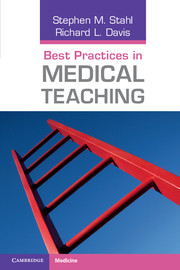Book contents
- Frontmatter
- Contents
- Preface
- About the authors
- Foreword
- Acknowledgments
- Introduction
- 1 Applying the principles of adult education to the designing of medical presentations
- 2 Using audience learning psychology to advantage in designing and delivering medical presentations
- 3 Executing the principles of adult learning in medical presentations
- 4 Measuring outcomes and ensuring success
- 5 Using interval learning in a comprehensive medical educational program
- References
- Progress check answer keys
- Progress check answer sheets
- Index
Foreword
Published online by Cambridge University Press: 05 August 2011
- Frontmatter
- Contents
- Preface
- About the authors
- Foreword
- Acknowledgments
- Introduction
- 1 Applying the principles of adult education to the designing of medical presentations
- 2 Using audience learning psychology to advantage in designing and delivering medical presentations
- 3 Executing the principles of adult learning in medical presentations
- 4 Measuring outcomes and ensuring success
- 5 Using interval learning in a comprehensive medical educational program
- References
- Progress check answer keys
- Progress check answer sheets
- Index
Summary
Maestro Stahl has done it again. Instead of educating us on cutting-edge theory and pragmatics of neuropsychopharmacology, he is taking it one step further, teaching us how to better educate others. The target audience for this timely, concise, yet comprehensive pearl is medical educators, but the lessons he and Richard Davis illustrate are applicable to a much broader audience. Stephen Stahl is widely regarded as one of the best, most effective and most influential teachers of contemporary psychopharmacology. On these pages, like a master pitching coach, he breaks down the essential mechanics, step by step, of effective pedagogy and delivery. Even novices, as well as the already established teachers, can assimilate the message, apply the material and improve their game.
He walks the walk and talks the talk. One of the most important aspects of this book is that it is written in precisely the way Stahl and Davis agree presentations should be made. There is an initial “grabber” set in the Preface, telling the reader why it's so important to attend to what he or she is about to read. Then there's a middle section, with lots of repetition and self-assessment tools to make sure the reader understands the material and plans to use it. Finally, there are ample summaries, posttests, and evaluations. Each lesson is well illustrated with the kind of graphics that clarify and amplify the written word and the lessons are broken down in manageable bits that don't overwhelm the reader.
Information
- Type
- Chapter
- Information
- Best Practices in Medical Teaching , pp. xi - xiiPublisher: Cambridge University PressPrint publication year: 2011
